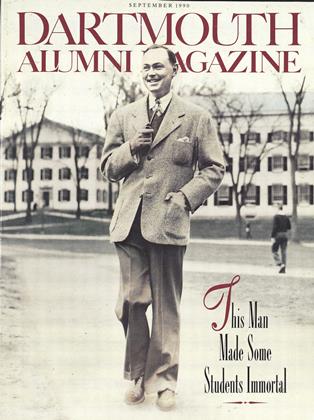1770
The Wheelock Administration discourages student athletes from "that which is puerile, such as playing with balls and bowls." The biggest impediment to sports, however, is not the administration but livestock grazing on the Green.
1846
Football, or something like it, makes its campus debut. Teams are selected along class lines and as many as 100 players kick, shove, tackle, and fight their way across the Green.
1876
Students put up the College's first goal posts. The administration tears them down.
1880
Dartmouth starts a rugby team. The faculty think the game is too rough and refuse to excuse students from class for out-of-town games. Some students also hate the game, but for a different reason. According to College historian Wilder Dwight Quint,"They feared that the pastime was too much an aping of effete England and that it would tend to produce a race of effeminates."
1889
The Dartmouth optimistically reports that fraternity hazing is in decline because "athletics require too much attention."
1891
"Men who exercise and stir up their blood are able to think more clearly than those who take no exercise," or at least that is the line a freshman uses to placate his wary father. The freshman, Fred Folsom '93, later becomes a Dartmouth football coach.
1913
The evening following Dartmouth's football victory over Princeton, 250 pajama-clad freshmen run circles around a hastily built bonfire. After three orbits they depart "minus every stitch of their nocturnal apparel," reports The Dartmouth.
1939
An article about corruption in college football appears in the American Mercury. Besides citing Dartmouth for questionable recruiting and admissions practices, the author quotes an anonymous linebacker as saying that influential alumni regularly send him cash.
1971
A swimming meet against Williams marks the first time that Dartmouth men compete against women athletes. The writer for The Dartmouth gleefully reports how badly Williams was trounced and notes "the Dartmouth team made no bones about their wish to establish male superiority."
1990
The faculty consider a proposal to drop the Physical Education requirement. The D quotes Robert McGrath, professor of art history as saying "The notion of 'sound mind and sound body' are vestiges of the 19th century that Dartmouth has abandoned." The faculty, however, tables the proposal, M
By 1883 the track team dropped silly events like horizontal pole vaults and sack races to concentrate on intercollegiate meets. This was not the first time sports helped define Dartmouth's competitive self-image.
 View Full Issue
View Full Issue
More From This Issue
-
 Feature
FeatureThe Real Story Behind the Lower Forty Shooting, Angling and Inside Straight Club
September 1990 By Robert Sullivan '75 -
 Feature
FeatureSeidman's Early Withdrawal
September 1990 By Susan Dentzer '77 -
 Feature
FeaturePROBLEM SOLVER
September 1990 By John Aronsohn '90 -
 Feature
FeatureMaking Contact
September 1990 By Kathy Maddock '87 -
 Article
ArticleMOTHERS AND DAUGHTERS
September 1990 By Professor Marianne Hirsch -
 Article
ArticleDR. WHEELOCK'S JOURNAL
September 1990
Article
-
 Article
ArticleTHE BOSTON POW WOW
JULY 1931 -
 Article
ArticleLabor of Love.
DECEMBER 1966 -
 Article
ArticleTrack
March 1955 By Cliff Jordan '45 -
 Article
ArticleDartmouth in the New Deal
April 1934 By H. Philip Patey '98 -
 Article
ArticleProf's Choice
DECEMBER 1998 By Professor Judy Worman -
 Article
ArticleAddress to the College
June 1942 By THOMAS W. McELIN '42

